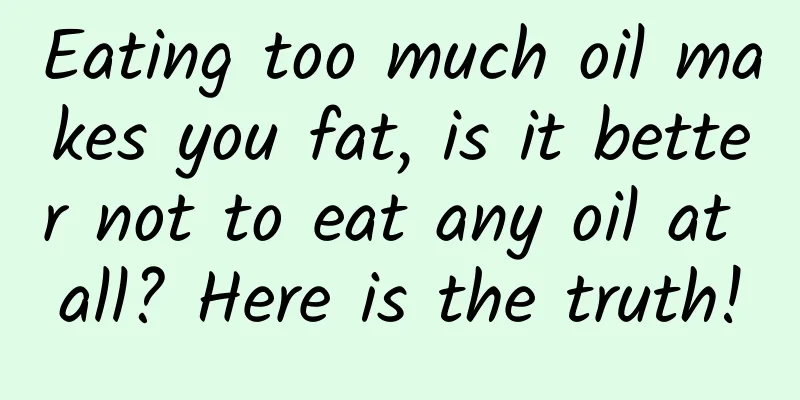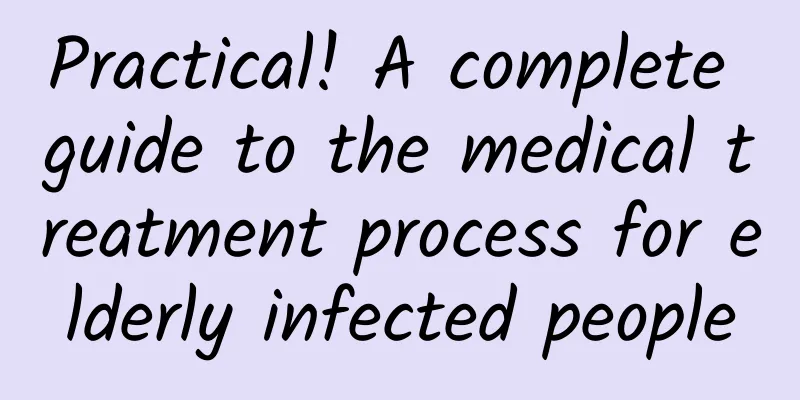Eating too much oil makes you fat, is it better not to eat any oil at all? Here is the truth!

|
Editor's note: Many people now say that eating too much oil is bad for your health and that you are overweight, so they advocate reducing oil intake. So, if you don't eat any oil at all, will you be healthier? For example, if you don't eat meat and only eat boiled vegetables, will you be healthier? Today, the editor will reveal the truth to you! Beijing Center for Disease Control and Prevention Tips: 1. Lipids are important nutrients Lipids include fats and lipids, which are one of the three major nutrients. They are important nutrients and have important physiological effects and functions. Fat is an important component of the human body. Adipose tissue is the main place for the human body to store and supply energy. Body fat is mainly distributed under the skin and around the internal organs, especially in the greater omentum in the abdominal cavity and around the kidneys. It protects our internal organs, plays a role in protection and mechanical support, and helps the body maintain a constant body temperature. In addition to providing us with energy and materials for the synthesis of body fat, the fat in food can also improve the color, aroma and taste of food, facilitate digestion and absorption, increase satiety, and provide fat-soluble vitamins. In addition, there are some fatty acids that are indispensable to our human body, but cannot be synthesized by ourselves. This essential fatty acid can only be obtained through food. Lipids are also the main components of the brain and nervous system, and are closely related to human fertility. 2. The fundamental reason for reducing oil intake is excessive oil intake It is not the fat itself that causes harm, but the inappropriate intake. The survey shows that the average daily cooking oil intake of Chinese residents is 42.1 grams, which is much higher than our current recommended value. Even 26% of residents consume more than 50 grams of cooking oil per day. Therefore, we cannot deny fat completely or even completely eliminate it from our daily life. Instead, we should choose the intake amount scientifically and reduce it in a planned way to meet the requirement of "healthy adults should not consume more than 25 grams of cooking oil per day". This will ensure the body's needs while not causing health problems due to excessive intake. 3. Reduce oil consumption rationally and scientifically Oil reduction is not just "removing" oil blindly. Scientific oil reduction requires us to learn the necessary oil reduction knowledge and master the necessary oil reduction skills. Let's learn together and reduce oil scientifically! Learn to use an oil control pot to control cooking oil intake Pour the cooking oil that the whole family should consume every day into a graduated oil control pot. Use the oil for cooking from the oil control pot. Adhere to the quantitative oil usage of the family and control the total amount. Cooking with less oil When cooking food, try to choose methods that use no or little oil, such as steaming, boiling, stewing, braising, sautéing, cold dressing, quick stir-frying, etc. Frying instead of deep-frying can also reduce the intake of cooking oil. Eat less fried foods Do not eat fried foods, or reduce the frequency of eating them, such as fried chicken legs, French fries, fried chicken wings, fried dough sticks and cakes, etc. When dining out, actively ask the restaurant to use less oil and order fewer fried dishes. Use less animal fat It is recommended to reduce the amount and frequency of animal fat use, or replace it with vegetable oil; when using vegetable oil, it is recommended to use different types alternately. Limit trans fatty acid intake Most of the trans fatty acids in our diet come from margarine, shortening, and margarine, which are hidden in our daily Western-style pastries such as cream cakes and bread, baked foods such as biscuits and crackers, fried foods such as French fries and fried chicken nuggets, and processed foods such as chocolate candies and ice cream. It is recommended that the daily intake of trans fatty acids should not exceed 2g. Therefore, eat less of the above foods. No vegetable soup When cooking dishes, some of the fat will remain in the soup. It is recommended not to drink the soup or eat rice with the soup. Pay attention to food nutrition facts Learn to read nutrition labels, and when buying food in supermarkets, choose foods that are low in fat and do not contain trans fatty acids. You can pay attention to the ingredient list of packaged foods. If there are words such as hydrogenated oil, margarine, shortening, etc., it means that the food contains trans fatty acids. |
<<: Is blended oil good? Should I buy it?
>>: What kind of fruit is plum? Is plum an apricot?
Recommend
How to reduce wrinkles
When people get old, their skin becomes loose and...
What is the growing environment of baby cabbage? Where are baby cabbage mainly grown?
Baby cabbage is long cylindrical in shape, with a...
Women with urinary tract infection take Sanjin tablets
The female urinary tract system is special and is...
What tests should be done for pelvic inflammatory disease?
Women's physical constitution is not as good ...
Treatment of gynecological inflammation with Chinese medicine fumigation
Many women suffer from gynecological inflammation...
Why do women dislike sex?
Some women have begun to aversion to sex since th...
The best time for postpartum sweat steaming
Sweat steaming is a popular health-preserving met...
What are the drugs for treating emphysema? What should we pay attention to in our daily life?
Author: Wang Guangfa, Chief Physician, Peking Uni...
37 weeks lower body pain
Women's bodies react more strongly in the lat...
What should I do if there is a small lump inside the areola?
The areola is an important tissue on the breast. ...
[Medical Q&A] What should I do if my nosebleed won’t stop?
Planner: Chinese Medical Association Reviewer: Gu...
What can't you do when you have your period?
Menstruation refers to the menstruation during a ...
Who are the "superheroes" in the intestine? The "Justice League" of prebiotics and probiotics
In today's pursuit of a healthy life, the ter...
What are the causes of gynecological inflammatory cell hyperplasia?
Gynecological inflammation has always been a majo...
Can I use enema in early pregnancy?
In the early stages of pregnancy, pregnant women ...









